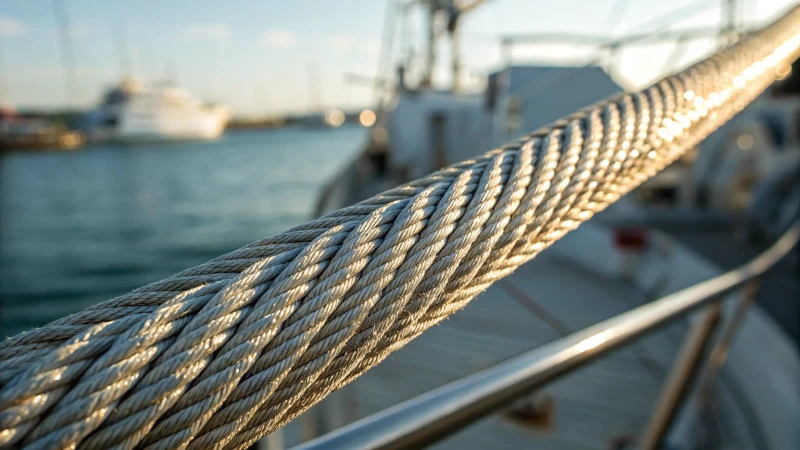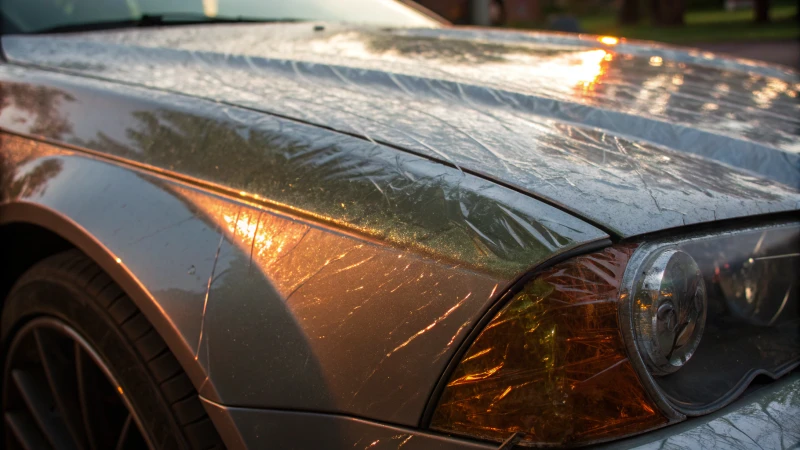
Imagine standing on a construction site, the wind in your hair and the sea nearby. You need materials that withstand the toughest conditions.
Plastic coated steel wire ropes are a game-changer. They offer exceptional resistance to UV rays, saltwater, and abrasion, outperforming uncoated ropes in durability and flexibility. Perfect for outdoor and marine environments, their slightly higher cost pays off with longevity and reliability.
Investing in these ropes might feel like a leap, especially when you're juggling budgets and deadlines. But trust me, in the long run, the durability and reduced maintenance needs of plastic coated steel wire ropes make them worth every penny. Let me share more about their benefits and why they could be the smart choice for your next big project.
Plastic coated ropes resist UV better than uncoated ropes.True
The plastic coating provides an additional layer that protects against UV damage.
Uncoated ropes are more flexible than plastic coated ones.False
Plastic coating enhances flexibility by reducing friction between strands.
How Does Plastic Coating Enhance Durability?
Imagine a world where your everyday materials suddenly become superheroes, fighting off environmental villains like corrosion and abrasion with ease.
Plastic coatings enhance durability by creating a shield against environmental damage, such as corrosion and abrasion, significantly extending the lifespan of materials in challenging conditions.

The Science Behind Plastic Coating
Let's take a moment to appreciate how plastic coatings work their magic. Picture it as wrapping your precious materials in an invisible armor that stands guard against moisture, harsh UV rays, and other environmental baddies. When I first learned about this, it reminded me of the protective bubble my mom would insist on putting around our old family car to ward off rust during rainy seasons. It was a hassle, but it worked!
Now, imagine this same protective instinct applied to materials like steel wire ropes, especially those exposed to the sea's salty air or the sun's harsh glare. For instance, plastic-coated steel wire ropes are excellent at resisting saltwater and UV exposure, which is why they're a favorite for marine applications. This plastic layer acts like a brave knight, taking on the environmental wear and tear so the underlying material stays strong and steady.
Advantages of Different Plastic Types
Not all plastic coatings are created equal; each type brings something unique to the table. I remember being fascinated by this fact during a conversation with a friend who works in construction. Here's how different coatings make a difference:
- PVC Coatings: These are like the flexible, sun-loving adventurers of the group. They thrive outdoors, offering excellent UV resistance and increasing a rope's lifespan by up to 50%.
- Polyethylene Coatings: Imagine these as the chemistry whizzes—they excel in environments with harsh chemicals due to their superior chemical resistance.
Below is a comparative table showcasing some key properties:
| Plastic Type | Flexibility | UV Resistance | Chemical Resistance |
|---|---|---|---|
| PVC | High | High | Moderate |
| Polyethylene | Moderate | Moderate | High |
Applications Across Industries
The magic of plastic coatings spreads across various industries, making them indispensable. Take mining operations—these environments are relentless, demanding materials that can withstand constant pressure and abrasion. I once chatted with a mining engineer who swore by the reliability of coated ropes for ensuring safety and maintaining structural integrity under extreme conditions.
In construction, it's a similar story. Coated ropes are used for lifting and rigging where they handle stress without flinching thanks to their extra layer1 of protection. Whether it's securing a skyscraper or hoisting heavy equipment, plastic coatings offer an extra sense of security.
As industries continue to evolve, pushing boundaries of durability and reliability, plastic coatings remain a steadfast ally in prolonging material life and ensuring everything runs smoothly. It's like having an invisible helper2 always watching your back!
Plastic coatings prevent UV damage.True
Plastic coatings block UV rays, protecting materials from degradation.
PVC coatings offer high chemical resistance.False
PVC coatings have moderate chemical resistance, not high as polyethylene.
What Are the Cost Benefits of Using Plastic Coated Ropes?
Ever found yourself weighing the pros and cons of plastic coated ropes? Let's delve into whether their cost is justified and how they stack up against traditional options.
Plastic coated ropes, although initially 30% pricier, boast remarkable durability, UV, and abrasion resistance, significantly prolonging their lifespan by up to 50%. These attributes often justify the initial investment, especially in demanding environments.

Durability and Service Life
I remember the first time I opted for plastic coated ropes over the traditional ones. The difference was night and day. These ropes, especially those with PVC or polyethylene coatings, are known for their exceptional durability3. Think about that one time you left your favorite tool outside in the rain, only to find it rusty the next day. Well, these ropes are like that tool if it had a magical shield—perfect for harsh environments like marine or outdoor settings. Studies even show PVC-coated ropes can extend service life by up to 50% compared to uncoated alternatives.
Resistance to Environmental Factors
Once, during a construction project near the coast, I was amazed at how well these ropes held up against saltwater and sun exposure. They’re engineered to resist UV rays, saltwater, and abrasion, making them ideal for industries like construction and marine. This kind of protection means fewer replacements and repairs over time—talk about long-term savings4!
| Feature | Uncoated Ropes | Plastic Coated Ropes |
|---|---|---|
| UV Resistance | Low | High |
| Saltwater Resistance | Moderate | High |
| Abrasion Resistance | Low | High |
Flexibility in Applications
The plastic coating adds a layer of flexibility that makes these ropes incredibly versatile. Whether you're using them with winches or lifting equipment, they adapt with ease. It's like having a Swiss Army knife of ropes—ready for anything. This flexibility means fewer limitations5 in operational use.
Cost-Effectiveness Over Time
I know what you’re thinking: "But they’re 30% more expensive!" Yes, they are—but think of it like buying a quality pair of boots. They cost more upfront but last way longer. With reduced maintenance and fewer replacements, users often find that the overall savings add up.
Tailored Solutions for Specific Needs
For industries that require high-performance solutions—think construction or mining—plastic coated ropes align perfectly with operational needs. They reduce downtime and boost efficiency, which is always a win in my book.
In conclusion, when I weigh the benefits against the cost, it’s clear that for industries where rope performance is crucial, the extra investment in plastic coated options is often justified. Utilizing cost analysis tools6 can help assess specific business needs and determine the most economical choice over the product's lifespan.
Plastic coated ropes extend service life by 50%.True
PVC-coated ropes have shown to last 50% longer than uncoated ones.
Plastic coated ropes are less resistant to UV rays.False
They are highly resistant to UV rays, unlike uncoated ropes.
What Applications Are Best Suited for Plastic Coated Wire Ropes?
Have you ever wondered why plastic-coated wire ropes are a game changer in demanding environments?
Plastic-coated wire ropes are perfect for marine, construction, and industrial applications because they resist corrosion, UV damage, and abrasion, making them ideal for outdoor settings.

Marine and Offshore Applications
When I first encountered plastic-coated wire ropes in a marine setting, I was amazed at how they thrived amidst the harsh, salty sea air. These ropes are indispensable for tasks like mooring lines and trawl nets, where the elements are unforgiving. Imagine a sunny day on the deck of a vessel; the PVC coatings7 stand resilient against the relentless UV rays, ensuring longevity and safety.
Construction Industry Use Cases
In construction, where every day brings a new challenge, these ropes are nothing short of a lifesaver. I remember overseeing a project where we needed a reliable solution for our cranes and hoists. The flexibility and strength of plastic-coated wire ropes meant they could handle the heavy lifting while enduring abrasive environments. The polyethylene coatings8 added an extra layer of durability that we relied upon daily.
Industrial Equipment
In the industrial world, efficiency is everything. I recall a time when we switched to plastic-coated wire ropes for our conveyor systems. Their smooth operation minimized downtime caused by wear and tear, a common issue with traditional ropes. This switch transformed our production line's performance.
A table below highlights some key properties:
| Coating Material | Key Feature |
|---|---|
| PVC | UV Resistance |
| Polyethylene | Abrasion Resistance |
Environmental and Safety Benefits
What truly won me over was the safety aspect. These ropes reduce injury risks by preventing fraying wires—a crucial benefit in industrial applications9 where safety is non-negotiable. Plus, their ability to withstand extreme temperatures means they're suited for diverse climates, adding versatility to their list of attributes.
Plastic-coated wire ropes are UV resistant.True
PVC coatings provide excellent UV resistance, ideal for marine use.
Polyethylene coatings reduce wire rope flexibility.False
Polyethylene enhances durability without compromising flexibility in ropes.
How Do Plastic Coated Ropes Compare to Galvanized Options?
Ever found yourself torn between choosing plastic-coated and galvanized ropes for your project? I certainly have.
Plastic-coated ropes excel in UV and saltwater resistance, perfect for marine use, while galvanized ropes are cost-effective with strong tensile strength, ideal for construction.

Key Differences Between Plastic Coated and Galvanized Ropes
| Feature | Plastic Coated Ropes | Galvanized Ropes |
|---|---|---|
| Durability | Enhanced UV and weather resistance | Stronger in dry conditions |
| Cost | Generally 30% higher than galvanized | More budget-friendly |
| Flexibility | Offers better flexibility | Less flexible |
| Corrosion Resistance | Excellent in harsh, marine environments | Good in mild to moderate environments |
I've always been the kind of person who loves spending time near the water, so when it comes to choosing ropes for projects that involve the sea, I naturally lean towards plastic-coated ones. They remind me of a summer spent sailing with friends, the salty breeze on our faces and the sun beaming down. These ropes, especially those with PVC coatings10, withstand the harshest marine conditions like champs. Their ability to fight off UV exposure and saltwater means they last longer, and that's crucial when you're out at sea.
On the flip side, I've also worked on some gritty construction sites, where every penny counts, and that's where galvanized ropes11 come into play. They're the sturdy, no-nonsense type—strong and cost-effective. I remember using them while working on a massive project downtown, knowing that despite their lack of fancy coatings, they'd hold up under pressure. But beware of extreme weather; they might not be the best choice when conditions turn sour.
In choosing the right rope for your job, consider what you're up against. Are you battling corrosive elements by the coast? Then maybe splurge a bit on plastic-coated. But if you're watching your budget and working inland, galvanized might be your best bet. For more in-depth comparisons, check out industry reports12 that dive into real-world performance.
Plastic coated ropes are 30% more expensive than galvanized ropes.True
Plastic coated ropes generally cost 30% more due to enhanced features.
Galvanized ropes are more flexible than plastic coated ropes.False
Plastic coated ropes offer better flexibility compared to galvanized ones.
Conclusion
Plastic coated steel wire ropes provide superior UV, saltwater, and abrasion resistance, enhancing durability and flexibility for outdoor and marine applications, justifying their higher initial cost.
-
Discover why plastic-coated ropes are preferred in construction for their enhanced durability and performance. ↩
-
Explore how plastic coatings act as barriers against environmental factors like UV rays and moisture. ↩
-
Understand how plastic coatings enhance rope durability, crucial for informed procurement decisions. ↩
-
Explore how initial costs translate into savings over time through reduced replacements. ↩
-
Learn how plastic coatings expand application possibilities for various industries. ↩
-
Find tools to evaluate whether the higher initial costs are justified in your specific context. ↩
-
PVC coatings enhance wire rope UV resistance, crucial for prolonged sun exposure in marine settings. ↩
-
Polyethylene coatings provide exceptional durability, ideal for heavy-duty lifting tasks. ↩
-
Plastic-coated ropes offer safety and durability, vital for industrial settings. ↩
-
Explore how PVC coatings enhance wire rope durability and flexibility in different environments. ↩
-
Understand why galvanized wire ropes are preferred for certain industrial applications. ↩
-
Gain insights into how different wire rope materials perform under various conditions. ↩

